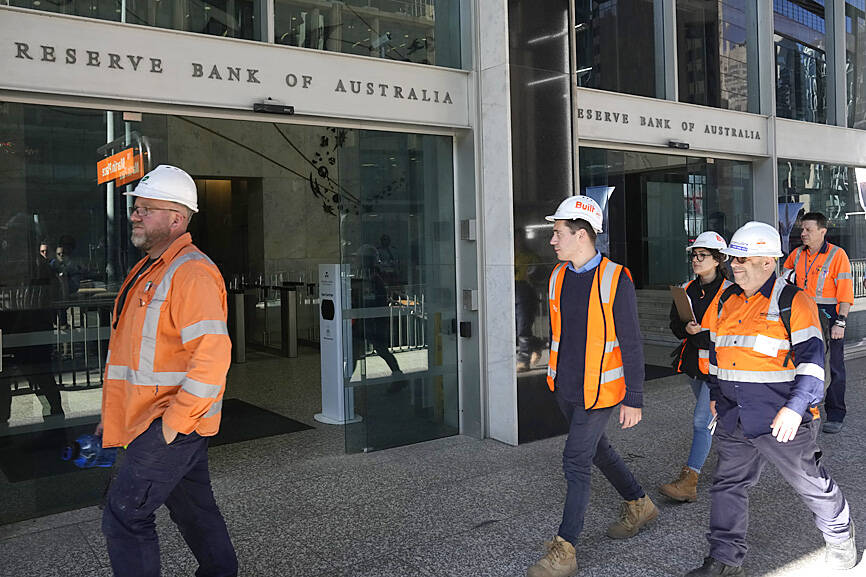Australia’s central bank left its benchmark interest rate at 4.1 percent at a policy meeting yesterday after inflation fell to 5.6 percent in May from 6.5 percent a month earlier.
The Reserve Bank of Australia (RBA) has lifted the cash rate 12 times since May last year to reduce inflation to a target range of 2 to 3 percent.
Higher interest rates raise the cost of borrowing for businesses and consumers, slowing economic activity and helping to relieve price pressures that have flared after the slowdowns of the COVID-19 pandemic.

Photo: AP
The RBA’s second pause of the year was predicted by about 60 percent of economists surveyed by Bloomberg, but Governor Philip Lowe said that further rises might be needed.
“Some further tightening of monetary policy may be required to ensure that inflation returns to target in a reasonable time frame, but that will depend upon how the economy and inflation evolve,” Lowe said in a statement.
“The decision to hold interest rates steady this month provides the board with more time to assess the state of the economy and the economic outlook and associated risks,” Lowe added.
Yesterday’s decision came as Australian Treasurer Jim Chalmers is this month due to make an announcement on the next RBA governor, with Lowe’s seven-year term expiring in mid-September. Some observers have warned that a move to replace Lowe during a tightening cycle might be perceived as political influence, particularly as his two predecessors received three-year extensions.
The governor has acknowledged that his policy path to cooling inflation while preserving employment gains is “narrow,” while reiterating that the bank would do what it takes to bring inflation back to target.
In a report, Oxford Economics Ltd said it expects the cash rate to eventually peak at 4.6 percent.
“While inflation has peaked, it remains uncomfortably high,” it said.
Globally, inflation pressures have abated somewhat, allowing the US Federal Reserve and other central banks to also slow or halt rate increases.
Additional reporting by Bloomberg

Hon Hai Precision Industry Co (鴻海精密) yesterday said that its research institute has launched its first advanced artificial intelligence (AI) large language model (LLM) using traditional Chinese, with technology assistance from Nvidia Corp. Hon Hai, also known as Foxconn Technology Group (富士康科技集團), said the LLM, FoxBrain, is expected to improve its data analysis capabilities for smart manufacturing, and electric vehicle and smart city development. An LLM is a type of AI trained on vast amounts of text data and uses deep learning techniques, particularly neural networks, to process and generate language. They are essential for building and improving AI-powered servers. Nvidia provided assistance

STILL HOPEFUL: Delayed payment of NT$5.35 billion from an Indian server client sent its earnings plunging last year, but the firm expects a gradual pickup ahead Asustek Computer Inc (華碩), the world’s No. 5 PC vendor, yesterday reported an 87 percent slump in net profit for last year, dragged by a massive overdue payment from an Indian cloud service provider. The Indian customer has delayed payment totaling NT$5.35 billion (US$162.7 million), Asustek chief financial officer Nick Wu (吳長榮) told an online earnings conference. Asustek shipped servers to India between April and June last year. The customer told Asustek that it is launching multiple fundraising projects and expected to repay the debt in the short term, Wu said. The Indian customer accounted for less than 10 percent to Asustek’s

‘DECENT RESULTS’: The company said it is confident thanks to an improving world economy and uptakes in new wireless and AI technologies, despite US uncertainty Pegatron Corp (和碩) yesterday said it plans to build a new server manufacturing factory in the US this year to address US President Donald Trump’s new tariff policy. That would be the second server production base for Pegatron in addition to the existing facilities in Taoyuan, the iPhone assembler said. Servers are one of the new businesses Pegatron has explored in recent years to develop a more balanced product lineup. “We aim to provide our services from a location in the vicinity of our customers,” Pegatron president and chief executive officer Gary Cheng (鄭光治) told an online earnings conference yesterday. “We

LEAK SOURCE? There would be concern over the possibility of tech leaks if TSMC were to form a joint venture to operate Intel’s factories, an analyst said Taiwan Semiconductor Manufacturing Co (TSMC, 台積電) yesterday stayed mum after a report said that the chipmaker has pitched chip designers Nvidia Corp, Advanced Micro Devices Inc and Broadcom Inc about taking a stake in a joint venture to operate Intel Corp’s factories. Industry sources told the Central News Agency (CNA) that the possibility of TSMC proposing to operate Intel’s wafer fabs is low, as the Taiwanese chipmaker has always focused on its core business. There is also concern over possible technology leaks if TSMC were to form a joint venture to operate Intel’s factories, Concord Securities Co (康和證券) analyst Kerry Huang (黃志祺)